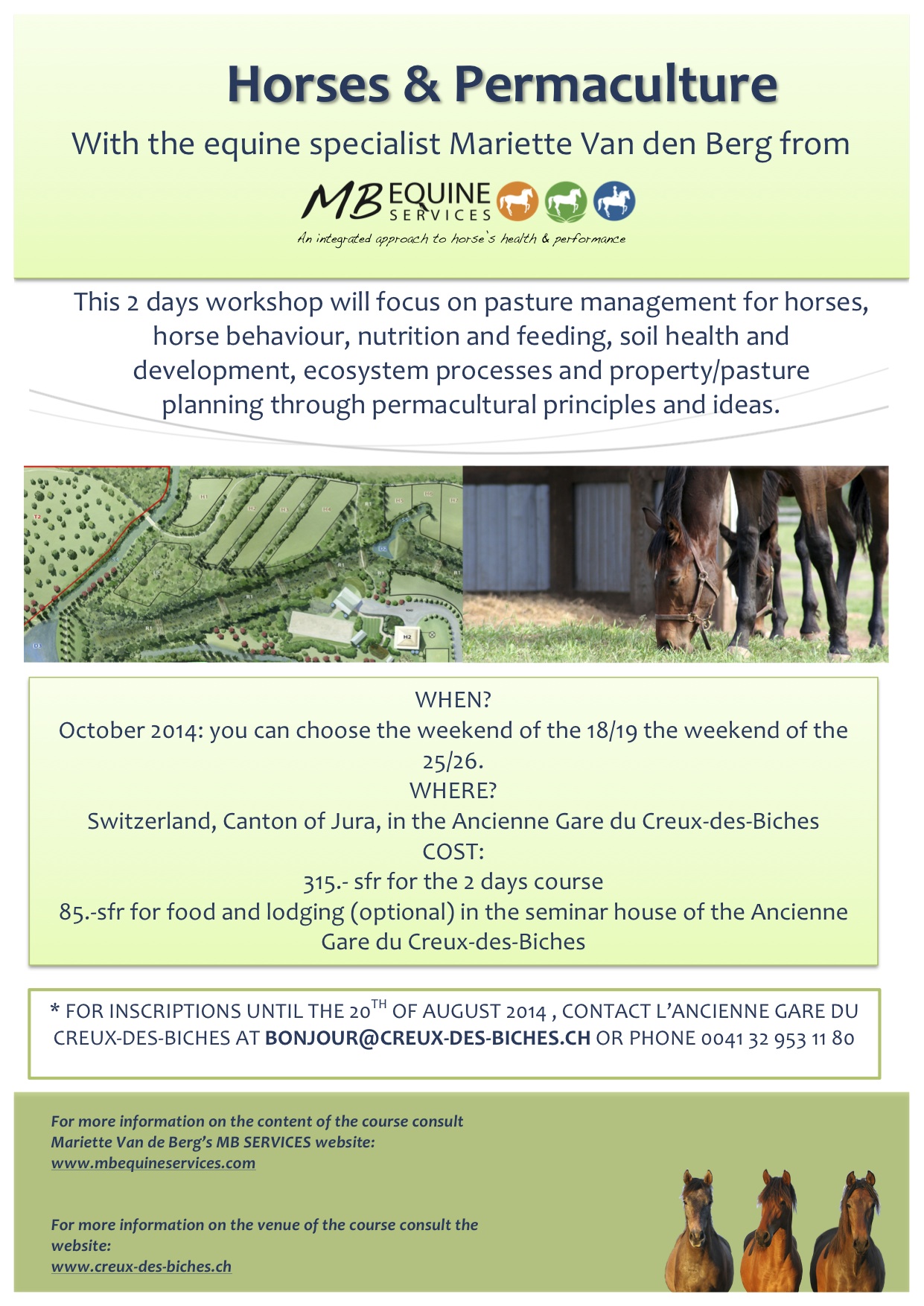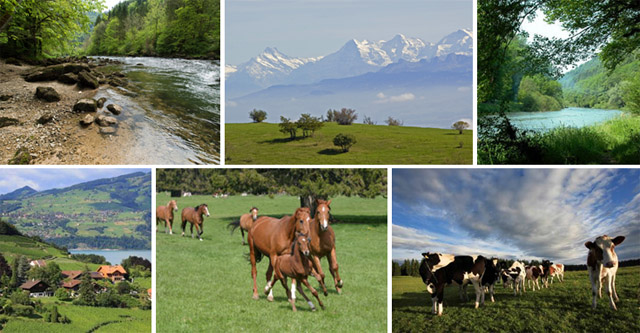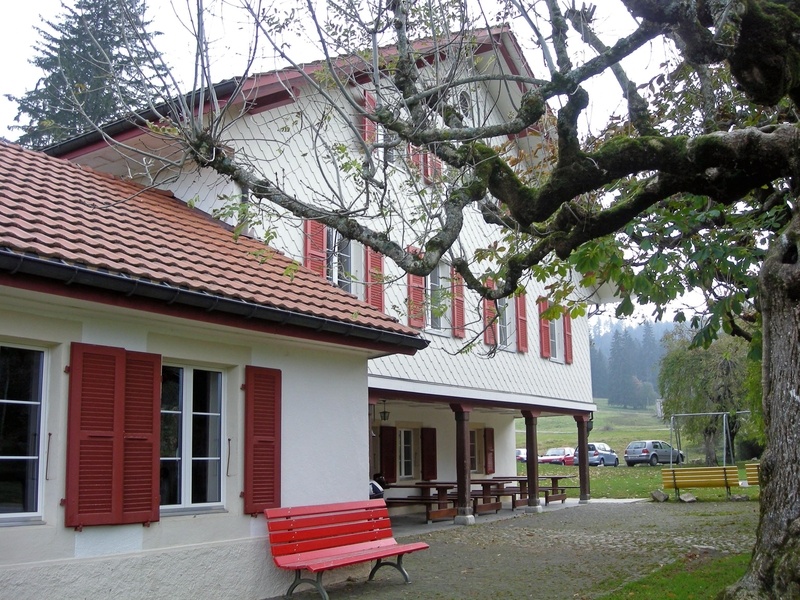International Equine Permaculture Workshop – Switzerland (Oct 2014)
MB Equine Services is very excited to announce that we will be hosting two 2-Day workshops on equine nutrition and permaculture in Switzerland (Canton du Jura) in October 2014!
On Day 1 (Healthy land = healthy horses) we will focus on common horses and land management issues around the world, horse nutrition (digestive system, feeding practices and disorders), horse behaviour (time budget and foraging strategies), pastures (grass growth and development), soil development, ecosystem management and introduction to pasture and grazing planning. On this day we will walk the Creux de Biches property and potentially visit another equine property.
On Day 2 (Planning = the bridge between the present and the future) we will get hands on with our property planning. First we will cover some theory on property planning steps and goal setting. In the afternoon we will start with the actual planning; current infrastructure mapping, natural feature mapping and future planning. At the end of the workshop we will finish the program with a short movie about implementing equine permaculture and the process of designing.
When: 18 & 19 and 25 & 26th of October!
Where: Le Creux-des-Biches http://www.creux-des-biches.ch/fr/le-creux-des-biches/
The old station Creux -des- Biches
Come home, relax, learn to understand nature and people, regain strength, recognize its place in the world, take heart
The old train station is a little oasis where people in a protected environment can learn about and develop new strategies and visions for future living. The guest house offers simple but comfortable shared rooms (single rooms with extra charge), a beautiful meditation room, kitchen and dining room with library. The property is located in the most beautiful hiking area at high level of free mountains and inhabited by friendly people, horses, chickens, rabbits and cats. At the moment a Permaculture paradise garden with a pond is being created. We are happy to provide our place for seminars, workshops, and new event projects.
For more information and booking: L’Ancienne Garde du Creux des Biches – Email: bonjour@creux-des-biches.ch Phone: +41 32 953 1180

Tenterfield NSW – Equine Nutrition & Pasture Management Workshop (March 2014)
* *******UPCOMING WORKSHOP**** New South Wales:
*******UPCOMING WORKSHOP**** New South Wales:
MARCH 2014
Integrated equine nutrition & pasture management.
GRANITE BORDERS LANDCARE TENTERFIELD
Where: Showgrounds, Tenterfield NSW
When: Saturday 8th of March
Time: 8:30 am (registration) 9:00 – 3:00pm
Costs: free (inlc Morning tea/lunch)
For more information and booking contact:
Co-ordinator – Mark Thomas
PH/Fax 02 6736 3500
Mobile 0404 892 696
Email: mark@gblc.org.au
http://www.graniteborderslandcare.com.au/index.html
Program:
Integrated horse nutrition & pasture management
Healthy land = healthy horses
• Common horse & land management issues
• Horse nutrition; digestive system, feeding practices
and disorders
• Horse behaviour – time budget and foraging strategies
• Pastures; grass growth & development
• Soil development
• Ecosystem management
• Introduction to pasture/grazing planning
• Practicum: Pasture/ land inspection – observing
SE QLD: Equine nutrition, pasture management & property planning workshops

In February South East QLD catchments organised a number of workshops in the Gold Coast and Sunshine Coast region. The workshops were well visited and we got a lot of positive feedback. The workshops were presented in blocks with an introduction workshop on integrated equine nutrition & pasture management and a follow up workshop on property planning.
These workshops were based on half day, so they only provide small snippets of information on a number of topics to help you with your research and management. It is unfortunately not possible to discuss all the aspects of horse nutrition, care, pasture management and property planning in half a day! It is merely to give you some ideas and principles. For a personal approach you still requires individual consulting with experts to review your property, horse management and feeding management. Nonetheless, it will provide you with an good overview and a starting point to find out more about certain topics! We asked the participants which topics they would like to see back in a new workshop:
- Pasture ID & planting (incl weed ID)
- Grazing planning
- Water management/harvesting
- (Native) vegetation / replanting
- Habitat & biodiversity
- Equine Nutrition
- Manure management & Composting techniques
Upcoming workshops SE QLD 
Visit the workshops! because you can shape it and vote for topics you are most interested in! So come along to the next series of workshops in South East Queensland:
- Saturday 16th of March: Horse Property Planning @ Nerang
- Sunday 17th of March: Integrated Equine Nutrition & Pasture Management @ Beaudesert
- Saturday 6th of April: Horse Property Planning @ Landsborough
- Sunday 7th of April: Integrated Equine Nutrition & Pasture Management @ Woodford
More information & flyers: http://www.facebook.com/MB.Equine.Services
Research Alternative Forages for Horses
 In 2012 I started my PhD project at the University of New England. The main focus of my study is patch foraging behaviour, particular browsing behaviour, in horses and the use of fodder trees and shrubs as forage enrichment for domesticated horses in Australia. This research will help the horse industry to better understand the potential use of alternative and suitable forage sources and the affect of forage enrichment on the behaviour of horses in intensive equine management systems.
In 2012 I started my PhD project at the University of New England. The main focus of my study is patch foraging behaviour, particular browsing behaviour, in horses and the use of fodder trees and shrubs as forage enrichment for domesticated horses in Australia. This research will help the horse industry to better understand the potential use of alternative and suitable forage sources and the affect of forage enrichment on the behaviour of horses in intensive equine management systems.
Patch foraging behaviour and animal welfare
Why this interest in patch foraging behaviour? I believe that the ability to browse on a range of trees, shrubs, herbaceous plants, roots and mosses might be important for the health and well-being of horses.
In 2009, I moved to Australia from The Netherlands and founded MB Equine Services, which provides specialised equine nutrition and horse property design and pasture management. “Designing pasture systems is part of the business,” I started to investigate the role of alternative forage sources as a drought reserve. And a bit of research made me realise that, in nature, horses browse a lot.
This raised the question: ‘How do domesticated horses cope with an enclosed environment in which there is no – or limited – access to browsing?’ Is there something in browsing that might be important for their nutrient balance or gut and dental health?”
I hope to provide some answers to these questions in my research towards a doctoral degree at UNE. “We don’t often provide our horses with the alternative foods that – in nature – are a large part of their diet,” Variety is the spice of life for herbivores – whether they are confined, or foraging on pastures or rangelands – as well as for people. Like us, they are periodically satiated by familiarity and thrive on variety.
We keep horses in a stable or a paddock without feeling obliged to enrich their lives – and edible enrichment has been shown to be the best sort. Such enrichment could address problems of abnormal behaviour and help to avoid ulcers and dental problems.”
Farmers know that planting shrubs and trees on their properties has a range of environmental and agricultural benefits, and this possible advantage for their horses could add to that list of benefits.
Research
The first stage of the research program was a survey. You may have seen it advertised or may have even participated! If so, thank you for your contribution. This survey allowed us to collect data on how horses are managed and identify if browsing is a common behaviour in domesticated horses in Australia. I am currently conducting the data analysis and writing it up for a journal publication.
The next step is to investigate some of the questions why horses select a variety of foods and when they are more likely to ingest novel and familiar foods. The novel foods will be browse fodder. To be able to answer these questions we will conduct non-invasive preference tests with horses. We will record their behaviour by video recording. The first experiment will hopefully run later this year.
So for now I am working with novel forages, collecting browse from a variety of trees and shrubs and drying them. We need a lot of fresh browse to make a chaff. So over the coming months we will collect these forages so we can dry and chaff them for our testing. I am very curious how the horses will respond.

Keep checking our website and FB page for updates! I hope later this year to give you more information about the publication of the survey and progress of the research.
Dressage & Equitation Clinic- GIEC (QLD)
 Something different! Beside all the equine nutrition, pasture and property workshops we are also hosting a Dressage & Equitation clinic in February (Wed/Thur 20-21) at the Gatton Indoor Equestrian Centre (Gatton QLD).
Something different! Beside all the equine nutrition, pasture and property workshops we are also hosting a Dressage & Equitation clinic in February (Wed/Thur 20-21) at the Gatton Indoor Equestrian Centre (Gatton QLD).
The clinic is open for anybody that would like to improve their seat, posture and effect of aids.
An integrated approach using classical, balanced riding, biomechnics and evidence-based training principles.
WHEN: Wednesday 20th and Thursday 21st of February 2013
WHERE: Gatton Indoor Equestrian Centre- Gatton QLD
To nominate for the clinic email Fiona Edwards, fiona@diamondvalestud.com.au or call 04 07 586 540
Individual lessons (50 – 60 min) – cost lessons per day $100.00.
Prices include the hire of the arena (per person/per day).
Possibility to camp at the facility, additional fee of $20.00 per stable. Riders that book 2 days will have precedence. These clinics often have wait-lists, so Pre-payment is required to hold your spot.
For more information about the Camping facilities at Gatton Equestrian Centre contact Fiona.




Follow Us!